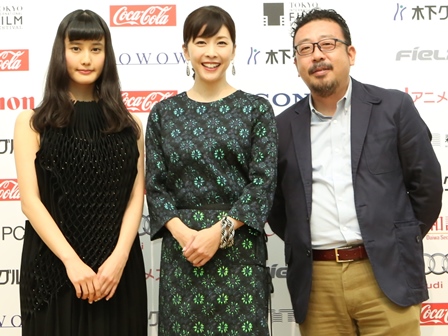
Yoshihiro Nakamura’s new film is being touted as a return to form for J-Horror, and perhaps even a return to basics for Nakamura himself, who hasn’t made a J-Horror film in ten years. In a sense, The Inerasable is a J-Horror film with meaning, i.e., a horror film with a deep social context, and one that contemporary Japanese viewers will be able to directly identify with.
The story is fairly conventional. A writer of popular horror stories (Yuko Takeuchi) receives a letter from a woman, Kubo (Ai Hashimoto), whose apartment seems to be haunted. Kubo hears strange swishing sounds at night, and starts asking her neighbors if they have heard them, too. She eventually discovers that the young man who occupied her apartment before her moved elsewhere and subsequently killed himself. Moreover, the family who moves in next door to her starts receiving disturbingly cryptic anonymous messages on her phone.
People who have never lived in Japan should probably be made aware of something that is well known in Japan: anyone interested in buying or renting properties where previous residents killed themselves may be appraised of the fact, and usually such properties are cheaper for that reason. This is not necessarily an important plot premise, but it does explain much of the appeal of the movie. As the author and the tenant investigate what is behind the mysterious deaths related to this particular piece of real estate, they find that uneasy spirits can travel from one property to another via bad faith. It may be a difficult concept for non-Japanese to grasp, but Nakamura makes it abundantly clear to his Japanese audience, who were suitably spooked during the screening I attended.
As were the cast. Both Takeuchi and Hashimoto confessed during the post-screening press conference that they were slightly intimidated when they received the script, since neither had ever appeared in a horror film before.
“I’m easily scared,” Takeuchi revealed. “So when I discovered it was a horror movie I hesitated at first.”
Hashimoto was more diplomatic. “When I receive an offer for a film I try to find out if it’s appropriate for me.” She didn’t seem too intimidated. “I can’t go to sleep at night anyway unless it’s pitch black.”
Nakamura found the script, based on a bestselling novel, appealing because “the story isn’t so set, it offers new discoveries, new details.” In fact, the movie would be better described as a mystery that requires solving rather than a horror story that needs to be endured.
Nevertheless, Nakamura was surprised that it had been accepted in the Competition section. As jury head Bryan Singer said earlier in the week, you usually don’t see horror movies in film festival competitions. His point had less to do with the scary stuff than the idea that Competition films tend to be super serious. “Horror is supposed to be fun,” Nakamura said.
[Philip Brasor]






















